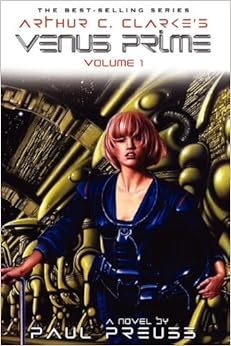Venus Prime Volume One is a science fiction thriller/crime drama that borrows so many elements from other genres that it feels disjointed, but that doesn't make it any less intense, philosophical, or intriguing. The author, Paul Preusss borrows heavily from an Arthur C. Clarke short story called "Breaking Strain," and the rest of the stories in the Venus Prime series similarly borrow from Clarke's fiction. The idea behind Clarke's original stories was to imagine human life on Venus, and in writing his stories he discovered challenges he had not originally imagined. Venus, for one, is too hot for human life and it's covered in acid, so people would need to invent special technology to survive there. But there may be some good reasons for people to want to go there - particularly for resources. Preuss's version of Clarke's original stories is an admirable work because of what Preuss adds to it himself, particularly the character of Sparta.
The woman, Sparta, was part of a secret project that sought to enhance human beings using biotechnology. This project failed and Sparta's memory was wiped, but she has since been subject to experimentation and examination by the government agency that started the project. That is, until her doctor decides, out of a sudden act of compassion, to reawaken her memories (minus the past three years or so). She escapes in dramatic fashion by flying a helicopter. Despite her lengthy containment away from the public, she seems to know exactly what to say and what to do to get what she wants. She is able to hack into any computer system using a USB-like device that extends from the tip of her finger. She is also able to break into a car in order to steal the sliver (credit card) from it and buy herself some food and other essentials.
After her escape the story turns to a plot with a wealthy woman named Sondra Sylvester who owns a mining corporation. She has purchased some robots capable of mining on the surface of Venus and wants them shipped there as soon as possible. The trouble is, the next ship to depart, the Star Queen, is still under repairs and the owners are scrambling to get it ready in time. Meanwhile, Sylvester is enjoying her time with her immature, but apparently alluring, partner, Nancybeth. She also has her eyes on a book, a one-of-a-kind item that is only the second-known copy to exist. It's called The Seven Pillars of Wisdom and is worth a good fortune. However, Sylvester is outbid by an old lover, which, frankly, pisses her off. The book becomes entwined in the plot when it is placed on the Star Queen in time for the voyage to Venus.
This stretch of plot is lengthy, and less interesting than Sparta's, and for some time I wondered if Preuss had forgotten about his star character. Fortunately, this is not the case. Sparta makes a life for herself and becomes involved in an investigation that, you might guess, is involved with the Star Queen. The second half of the book takes place on Venus, in Port Hesperus, though I won't reveal much what happens there, except that it turns into an intense police mystery, sort of a buddy cop kind of thing. It's easy to get lost in the details, but Sparta keeps things moving at a brisk pace, always several steps ahead of the audience - but even she makes her mistakes.
What starts out as a Bourne Identity-esque book, with a hero unsure of her identity but having no trouble with her enhanced training/powers, quickly turns into a business drama, and then a philosophical space thriller, and finally a mystery thriller. The best part of this is the third. This takes place on the Star Queen, where only two crew members were placed aboard, despite the customary rule of three. An accident happens, one that makes it impossible for the crew to survive the remainder of the trip. Preuss watches, with fascination, what these two men begin to think and how they behave. We see things from the perspective of the captain, Peter Grant, who makes assumptions about his crewmate, McNeil, that may or may not be wrong. Preuss wonders how a man, one who considers himself morally sound, would begin to act and think when his life is at stake. Two men, with the available oxygen supply, couldn't make the trip. But one - one would survive. How this plays out is intriguing.
But Sparta truly is the star of the show. Here is a woman who is a strong character, not just through technological enhancements, but through her confidence and her personality. It is fun to watch the way she asserts her authority over the case in Venus, making sure the man assigned to her, Viktor Proboda, knows she is in charge. Not that Proboda is your typical macho man; he realizes her competence and grows to admire her. Not only is Sparta competent in times of pressure, she is also very smart, much smarter than most everybody else. It's true she has some unfair advantages due to her tools and gifts, but the kinds of smarts she has come from more than enhanced technology. I enjoyed seeing Sparta's story unfold. She is the perfect sci-fi heroine, and she is the lead character of what has begun as an amazingly entertaining sci-fi series.

No comments:
Post a Comment